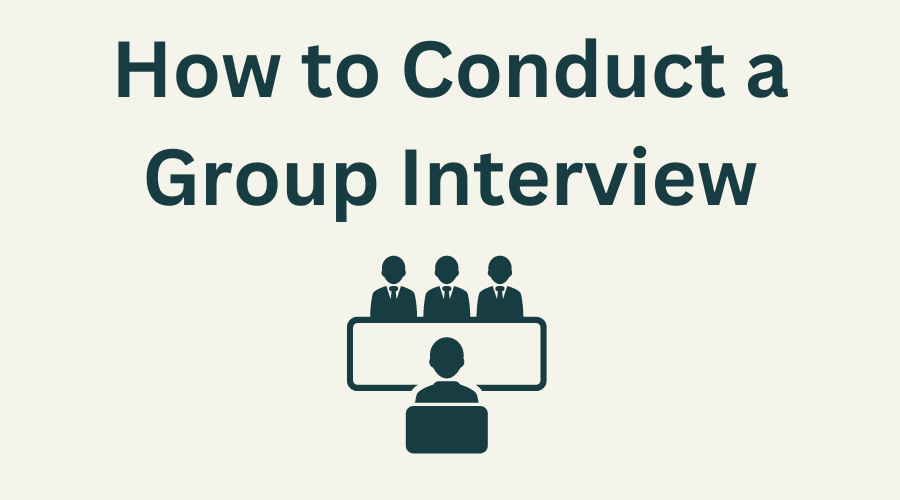
How to Conduct a Group Interview
A common interview style used by employers is the group interview. A typical group interview will involve several candidates sitting in a room with one or more interviewers. The interviewers will typically start by asking each candidate to introduce themselves and share their qualifications.
They may then ask group questions, such as "How would you handle a customer complaint?" or "What are your thoughts on our company's mission statement?"
The interviewers may also give the group a task to complete, such as brainstorming ideas for a new marketing campaign or solving a problem. The interviewers will observe how the candidates interact with each other and how they contribute to the group discussion.
At the end of the interview, the interviewers may ask each candidate any final questions. They may also give the candidates an opportunity to ask questions.
Group Interview Tips
Group interviews can be a valuable tool for employers to assess how candidates interact with others and contribute to a team environment. To conduct a successful group interview, there are several tips to keep in mind. First, it is important to establish clear objectives and guidelines for the interview.
This includes providing a clear agenda and outlining the specific tasks or questions that will be addressed during the session. Second, it is crucial to create a comfortable and inclusive atmosphere for the candidates. This can be achieved by encouraging open and respectful communication, actively listening to each candidate's contributions, and promoting collaboration among the group.
Lastly, it is essential to effectively observe and evaluate the candidates' performance throughout the interview. This can be done by taking detailed notes, assessing how individuals handle conflict or disagreements, and evaluating their ability to effectively communicate and work as part of a team.
By following these tips, employers can conduct a successful group interview that provides valuable insights into a candidate's abilities and suitability for a particular role.
Questions to Ask Candidates
During a group job interview, employers can ask a variety of questions to assess a candidate's qualifications and suitability for a role. Here are 10 example questions:
1. "Tell us about a time when you had to work collaboratively with a team to achieve a goal. How did you contribute to the team's success?"
2. "What strategies do you use to effectively communicate and resolve conflicts within a team?"
3. "How do you prioritize tasks and manage your time when working on multiple projects with competing deadlines?"
4. "Can you provide an example of a time when you had to think creatively to solve a problem in a team setting?"
5. "Describe a situation where you had to take on a leadership role within a group. How did you motivate and inspire your team members?"
6. "How do you handle feedback and constructive criticism from team members or supervisors?"
7. "Tell us about a time when you faced a challenge or setback as part of a team. How did you overcome it?"
8. "What role do you usually take on within a team? Are you more comfortable leading, supporting, or contributing ideas?"
9. "How do you ensure that everyone's opinions and ideas are heard and respected within a team?"
10. "Describe a time when you had to adapt to a change or unexpected situation within a team. How did you handle it?"
These questions allow employers to gauge a candidate's ability to work well in a team, communicate effectively, problem-solve, and demonstrate leadership skills. By asking these questions, employers can gain valuable insights into a candidate's suitability for a particular role and their potential for success within the company.
Group Interview Advantages and Disadvantages
Advantages of group interviews include the efficiency they create (especially in high volume scenarios) as well as learning how candidates can work work with one another. But there are also some downsides to consider.
One downside is that in a group interview, it can be challenging for each candidate to truly stand out and showcase their individual strengths and qualifications. With multiple candidates vying for attention, it can be difficult for interviewers to fully assess each candidate's potential.
Additionally, group interviews may not provide a comprehensive understanding of a candidate's individual skills and abilities, as the focus is primarily on how they interact within a group setting. Furthermore, some candidates may feel intimidated or overwhelmed by the presence of others, which can hinder their ability to perform at their best during the interview.
Lastly, group interviews can be time-consuming, as interviewers need to allocate sufficient time for each candidate to participate and contribute to the group discussion. Despite these downsides, with careful planning and consideration, group interviews can still provide valuable insights into a candidate's suitability for a particular role.


